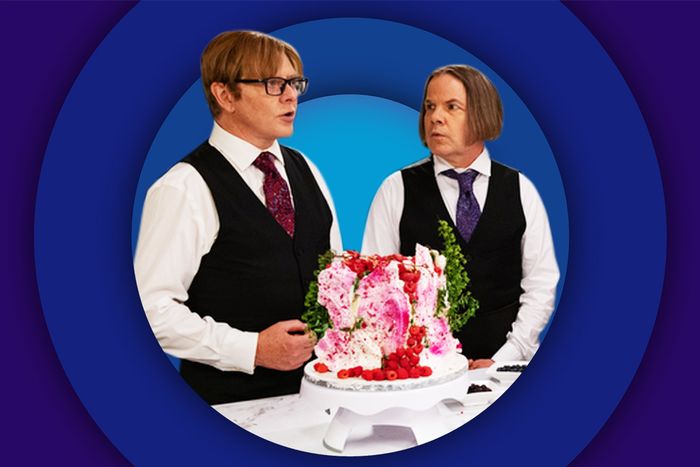
The Kids in the Hall are like a family — in that they fight all the time. They fight because they care. And they credit that caring and fighting for their sketch-comedy show’s lasting appeal. Even in their triumphant return on Amazon, despite decades spent growing up and becoming closer, writing sessions turned into fighting sessions. One example was the sketch “Tart,” which Scott Thompson wrote based on an idea he had but using characters created by Mark McKinney during their original run, which is a Kids no-no. But that wrestle for control resulted in a hilarious, bizarre, dark, and surprising sketch the whole group is proud of.
On Vulture’s Good One podcast this week, the Kids discuss producing their first season of sketch comedy in over 25 years and how things have changed for them in the intervening decades. Listen to the full episode below, and tune in to Good One every Thursday on Apple Podcasts, Spotify, Stitcher, Overcast, or wherever you get your podcasts.
On Playing Women
What’s amazing is, 30 years of comedy later, it’s still noticeable how differently you all play women in sketches, with how much more integrity you play female characters compared to comedy in the last decade or so.
Scott Thompson: I Guess.
Mark McKinney: We’re still playing women with a certain sort of three-dimensionality.
And how do you all do it?
Kevin McDonald: I just put a wig on and I became my mother. Though it’s not like my mother at all. She didn’t have a fake British accent like I do. But spiritually, it feels like, put your shoes on, your wig on, and I become my mother.
MM: Or someone else very close, someone whose essence you’ve absorbed.
ST: Well, you always play girlfriends, too. And your sister?
Bruce McCulloch: Yeah, my sister was Kathie, but I’m not a great actor. And when I did Tammy, I knew I was just going to pout a lot. And that’s all I fucking had.
KM: When I’m a woman. I’m stronger, I’m braver, I’m smarter.
ST: Sometimes it’s my mother. Sometimes it’s a woman I know. Sometimes it’s just a woman I’d like to be. And sometimes it’s just me, you know?
When you’re not working on the show, do you miss these opportunities to be women? To express that part of yourselves?
MM: If nothing else, for the creative exercise.
KM: Not the makeup. Like, not the hours in the makeup chair.
MM: I don’t miss the makeup.
Dave Foley: Or the wardrobe fittings … I think the way we played the women in the film, wardrobe and makeup were very much informed by the fact that we started out playing women with nothing — where we just did it with posture and inflection.
KM: And a purse.
DF: And so when we got to TV, we realized, Well, we can’t do that anymore. But we learned the skill of playing women from, I guess, the inside out.
On Bringing Back the Show
Right before the pandemic, it was announced you guys would be doing another season. What was the feeling of, Let’s do this now? How did it happen?
BM: We never talked about it; we just did it. And then we went down a little bit with the pandemic, and that gave us some time to kind of refresh some material and write some new stuff. I think it turned out for the best.
DM: And I think we just kind of all came to the conclusion individually that, yeah, we want the show to feel like the old show. We want the same kind of bumpers and the same Shadowy Men music, that sensibility.
How did you decide which characters from the original to bring back?
DM: It was a function entirely of who had a sketch they wanted to write about a character. And if you had a good idea for a sketch, we’d bring that character back.
BM: And we’re probably harder on our old characters because it’s kind of almost tacky to do, in a way. So they better be as good as the first one or in the ballpark.
On Getting Older
In general, were there conversations about how much you wanted the show to talk about getting older or the passing of time?
DF: Not specifically. It comes about naturally just because we’re writing about what’s on our minds and what, to our way of thinking, seems ridiculous about being alive. And one of the things that’s ridiculous about being alive, for all of us right now, is that we’re old.
BM: And I actually don’t like it. Because sometimes we were quick to go, “We’re old.” Like when I see Son Volt or something, I think, Oh, those guys are old. But man, are they cool! And so I think we’ve aged well in our brains or whatever.
MM: But we’re also not so old that we won’t live long enough to look back on this and go, “Wow, I was a lot younger then.”
DF: Like how young we looked in Death Comes to Town.
MM: I had an ab. I had my last ab.
These interview excerpts have been edited and condensed.
More From This Series
- Nate Bargatze Fought Hard for the ‘Washington’s Dream’ Sketch
- Katt Williams Tells the Stories Behind Three of His Best Jokes
- Ego Nwodim Is in Her Silly Season


